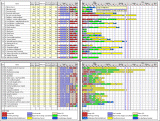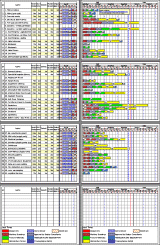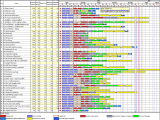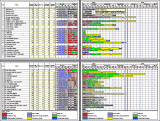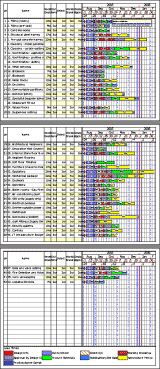Specifying horizontal and vertical pagination options
You can use the options in the Horizontal pagination and Vertical pagination groups on the Scaling tab of the Print dialog to determine the number of pages across which the view is printed. Project Viewer scales the view to fit on the number of pages that you specify.
From either or both groups, choose:
- True size to print the view at its horizontal or vertical size as determined by the chart scale. The horizontal and vertical scales shown on screen are used unless you override either one of them using the controls in the View scales group. When you select this option for horizontal pagination, you can select the Expand to fill space check box to expand the chart and date zone up to the edge of the border. If you turn off horizontal scaling, using the check box to the left of the Horizontal scaling field, the horizontal scaling of the output will be adjusted automatically to match the selected vertical scaling factor.
- Fit to at most to scale the view horizontally or vertically so that it fits on no more than the number of pages that you specify.
- Try to fit to exactly to scale the view horizontally or vertically to fit on exactly the number of pages that you specify.
The following illustrations depict two printouts in which True size has been selected in both the horizontal and vertical pagination options. In the first printout, both horizontal and vertical scales are set to 1, so the project prints at its normal size; in the second printout the horizontal scale remains at 1 but the vertical scale is set to 1.5, so the project prints at one and a half times its normal vertical scale:
|
|
|
|
True size with horizontal and |
True size with vertical scaling set to 1.5 |
The following illustrations depict two printouts in which Fit to at most has been selected in both the horizontal and vertical pagination options. In the first printout, both controls are set to 1 page; in the second printout the horizontal pagination control is set to 3 pages and the vertical pagination control is set to 2 pages. Note that although the horizontal control is set to 3 pages, the printout only uses 2 pages horizontally, as 3 pages are not actually required:
|
|
|
|
Fit to at most 1 page |
Fit to at most 3 pages horizontally |
The following illustrations depict two printouts in which Try to fit to exactly has been selected in both the horizontal and vertical pagination options. In the first printout, both controls are set to 1 page; in the second printout the vertical pagination control is set to 3 pages:
|
|
|
|
Try to fit to exactly 1 page |
Try to fit to exactly 1 page |
Alternatively, you can specify the horizontal and vertical scaling by clicking the appropriate buttons in the Print Preview toolbar:
- Click
 to specify the number of pages on which you want to print the output horizontally and vertically.
to specify the number of pages on which you want to print the output horizontally and vertically. - Click
 ,
,  and
and  to specify the horizontal scaling.
to specify the horizontal scaling. - Click
 ,
,  and
and  to specify the vertical scaling.
to specify the vertical scaling.
When using the Fit to at most and Try to fit exactly options, the output may not be scaled to fill the specified number of pages if doing so would distort the aspect ratio of the output. For example, if you choose to fit the output to ten pages horizontally and one page vertically, the output would probably not be scaled across all ten pages because that would distort its aspect ratio. Preview your output before printing to see how Project Viewer has scaled it.
If you set your horizontal pagination to Fit to at most and you limit your printing between two dates, but the specified date range is too narrow to fill a page, Project Viewer will not stretch the date zone on the printout, but will include any tasks that appear after the specified end date.
If you set your horizontal pagination to Try to fit exactly and you limit your printing between two dates, but the specified date range is too narrow to fill a page, Project Viewer will stretch the date zone on the printout, printing only those tasks that fit within the specified date range.
If you are printing a calendar view, you cannot specify the number of pages over which the view is printed; this is determined automatically.
Printing tiled or paginated output
Incorporating page breaks in your printouts
Printing a border around your output
